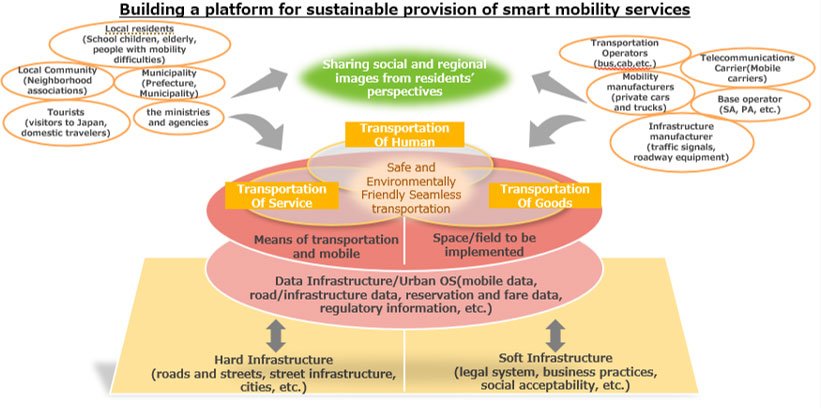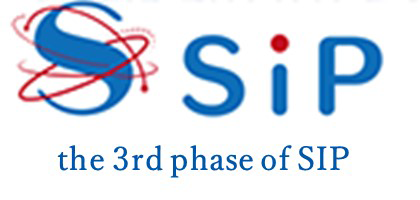The Cross-ministerial Strategic Innovation Promotion Program (SIP) is a national project led by the Cabinet Office and established under the Comprehensive Strategy on Science, Technology and Innovation and the Japan Revitalization Strategy.
In the third phase of the SIP, the Council for Science, Technology and Innovation (CSTI) of the Cabinet Office sets the issues that are important for solving social issues and for the Japanese economy and industrial competitiveness by backcasting towards the realization of Society 5.0 and determines the program director (PD) and budget allocation.
This project will promote cross-sectroral efforts that require collaboration between government, industry, and academia, with a view to achieving issues from basic research to social implementation.
Program outline
Future Vision in Society 5.0
Until now, in Japan and other countries, the value has been placed on the efficiency and functional enhancement of transport and mobility, and the emphasis has been on the development of services based on the pursuit of that value, and the development of heavy and large smart mobility such as "high-speed", "long-distance travel" and "large-scale" ('Smart Mobility 1.0").
On the other hand, the pursuit of efficiency and functional enhancements emphasized in "Smart Mobility 1.0" are not necessarily the optimum solution to realizing the society we are aiming for, and we need to increase the number of options available to accommodate changes in living environments and lifestyles. Therefore, it is becoming more important than ever to create spaces and environments that match the living environment with a focus on humans and pedestrians, and from the perspectives of "low speed", "short distance", and "small scale". In addition to the values of efficiency and functionality, there is also a need to focus on traditional values such as security, health, and comfort. It is expected to solve social issues such as medical care and education in local communities, the declining birthrate and aging population, education, regional development, and carbon neutrality, as well as to maintain and promote people's health and wellbeing, including the prevention of frailty.
Toward the realization of such a society, we aim to realize "Smart Mobility 2.0" through the utilization of mobility and the construction of platforms. In this program, we aim to realize "a society without mobility divide where everyone, goods, and services can move freely, independently, safely, comfortably, and in a way that is friendly to the environment, other people, and the community. Specifically, we aim to realize a society that achieves the following three goals, and to build a platform to support these goals.
- A society in which highly convenient, sustainable, and affordable mobility services are provided throughout Japan.
- A society in which urban development and mobility services are linked.
- A society in which logistics MaaS services are provided that incorporate not only passenger transportation but also the entire logistics system, including cargo handling and storage from origin to destination.
Mission
From the perspective of people, goods parcels, and services on the move, we will develop a platform that enables safe, fair secure, and environmentally friendly mobility that is made fair and seamless by dynamically integrating towns and regions with hard and soft infrastructure to allow the use of new mobilities along with the conventional public transport modes, private vehicles, cargo vehicles, and other extensive regional mobility resources.

Strategy for social implementation and R&D plan
Please see below for the "Strategy for social implementation and R&D plan(Written in Japanese)" of this program.
*Revised version was published on October 31, 2024.
Strategy for social implementation and R&D plan(Written in Japanese)
PD
Please see below for the "PD" of this program.
Management
Please see below for the "Management" of this program.




